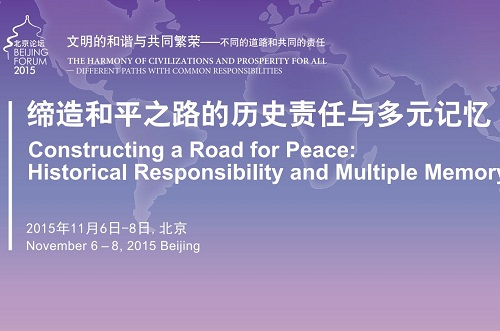

世界文明是在多种矛盾的冲突与调适、多元文化的交织与融汇、多方力量的竞争与凝聚、多条道路的开辟与选择之中,曲折发展,走向繁荣的。人类社会经历过和谐安定、欣欣向荣的时期,也遭遇过充满敌意的战争对抗。今年适逢世界反法西斯战争胜利七十周年,人们倍加珍惜和平,憧憬繁荣,渴望摆脱恐怖与战争,在一个多文明共存的世界里实现和谐共荣,就需要对战争与和平的历史记忆进行深入的研究与交流,从不同的角度探讨缔造和平道路的历史责任。
本分论坛由北大历史学系和剑桥大学历史学系合作举办,拟分为以下几个分议题:
一、从战乱走向和平的近代东亚道路
近代东亚国家及地区都曾经饱受战争和各种动乱之破坏,又由于在战乱中所处的地位不同、摆脱战乱走向和平的道路不同、战后发展繁荣的道路也不同,存在着复杂多元的历史记忆。这些复杂多元的历史记忆可能成为今后和谐发展与共同繁荣的宝贵借鉴,但也有可能误导出新的对抗。本分议题旨在探讨包括抗日战争在内的近代东亚各种战乱的根源、治乱兴衰的历史道路与责任,以及历史记忆与和平发展之间的相互关联。
二、丝绸之路西端各方在冷战与当代的角色
南欧北非是古丝绸之路的西部终端,也是今日“一路一带”的目的地之一。冷战是第二次世界大战后形成的又一次游走在战争边缘的国际格局,对东西方各地的发展影响至深。
本分组议题旨在深入研讨从冷战到当代的中国与另一端的交互关系。首先回顾这种关系的长时段历史动力,然后聚焦于现时的表现,特别是沿丝绸之路展现的欧亚地区整合的过程。地中海地区是研讨的重心之一,这里将成为未来岁月欧中关系的发展平台。通过对地中海南北岸区的整体分析,包括政治文化、经济整合、能源市场,本分议题研讨的关照将得以扩展。虽然中国在该区域的经济和政治方面尚属初试身手,但其影响力已属可观,且具战略意义。今日中国在地中海地区日益增长的影响,不仅仅涉及能源,而且涉及制造业、贸易,而最重要的是涉及该地区的安全领域。该区域日渐分化,直接影响到中国的贸易和能源供给,而从中东到中亚的动乱和极端主义还会损害中国的核心利益。本分组将汇聚中外欧洲与地中海区域研究者们对中国在这一世界关键性的地缘政治与区域经济中的成长角色的历史评估。
三、融合与扩散——区域与都市历史地理变迁的不同路径
在北京论坛的主题“文明的和谐与共同繁荣——不同的道路和共同的责任”的统照之下,本组分论坛拟从不同文明的互融(如明清以来西方文化因素在城市和区域空间形态上的反映)和重要经济、文化因素的传播扩散(如明末以来域外农作物品种在中国的广泛传播)等多种角度,展现历史经济地理和文化地理面貌的演变和重构过程,揭示缔造和平之路的历史责任与多元记忆。
The world civilizations are currently facing conflicts and issues linked to the necessity to adapt in a context of multiple contradictions, multicultural interweaving and combinations, multi-power competition and aggregation, and the opening and selecting of numerous different paths – all in the pursuit of prosperous development.
The history of mankind shows periods of harmonious stability and steady growth, but also times of conflict and hostilities.
This year marks the seventieth anniversary of the world’s victory over fascism. People aspire for peace and economic development, wish to prevent terrorism and war, and search for harmony and prosperity in a multicultural world. Therefore it is essential to initiatein-depth researches and dialogues on the history of war and peace; to use various viewpoints to look into the historical duties inherent to the construction of a road towards peace.
This panel is organized by the History Department of Peking University with the assistance of the History Department of Cambridge University.
It is divided into sessions that will address the following topics:
● The modern East Asian path - from the chaos of war to peace
All modern Eastern Asian countries have suffered from the ravages caused by periods of war and turmoil. During those,different positions co-existed, and various attempts were made to put a halt towar and move towards peace; post-war economic development has also been multi-faceted, and therefore historical memories are as complex as they are varied. This complexity can be used as a precious reference point for the future’s harmonious development and common prosperity, but it can also be the source of new problems. This panel aims to investigate the origins of the chaos caused by war in modern East Asia, and will include, but not be limited to, the War of Resistance against Japan, the historical route and approaches that led from war to order, and the inter connections that exist between historical memory and peaceful development.
In order to offer a better understanding of the fundamental developments that gave shape to the current political order in East Asia, our proposed panel will pay particular attention to the military events that shaped this order, and to the international diplomatic developments that created the essential basis for its continuity.
● The part played by countries west of the Silk Road from the Cold war until Today
Southern Europe and Northern Africa make the western end of the ancient Silk Road, and are also included in today’s "one belt one road" strategy. The Cold War that followed WWII was a time period when mankind, once again, came to the brink of war. It had a deep impact on the development of both Eastern and Western nations. The panel will look at the past dynamics of these Cold War years, and will also focus on the present, especially in light of the Eurasian integration process, and of the Silk Road initiative.
The panel will particularly concentrate on the Mediterranean as the geographical platform where Sino-European relations might develop in the next decades. By proposing a more holistic approach to the Mediterranean space, analyzed through the relations connecting its northern and southern shores, it will expand its focus by including political cultures, economic interdependence, and energy markets. While China’s economic and political footprint in the region is farfrom having reached its full maturity, its strategic impact has already beenfelt by actors in the field. China’s growing presence in the Mediterranean has now become a tangible phenomenon in areas which not only includes energy but also manufacturing, trade and, first and foremost, security. The growing balkanization of the region affects Chinese trade and energy supplies directly,while the increasing instability and extremism spreading from the Middle East to Central Asia impinge on Chinese core interests. The panel will bring together European and regional viewpoints on China’s growing role in one of the pivotal geopolitical and geo-economic areas in the world.
● Integration and diffusion - changes in the historical geography of regions and cities
In accordance with the Beijing Forum’s theme, “The Harmony of Civilizations and Prosperity for All - Different Paths with Common Responsibilities”, this panel will review various perspectives on proliferation and dissemination of civilizational fusion (such as the effects Western cultural factors had on the shaping of urban and regional spaces during the Ming and Qing dynasties); it will identify important economic and cultural factors (e.g. the extensive propagation of non-indigenous crops since the late Ming period), that led to the development and reconstruction of historical and economic geography, or of cultural geography, and show the historical responsibilities and memories of the road towards peace.
















